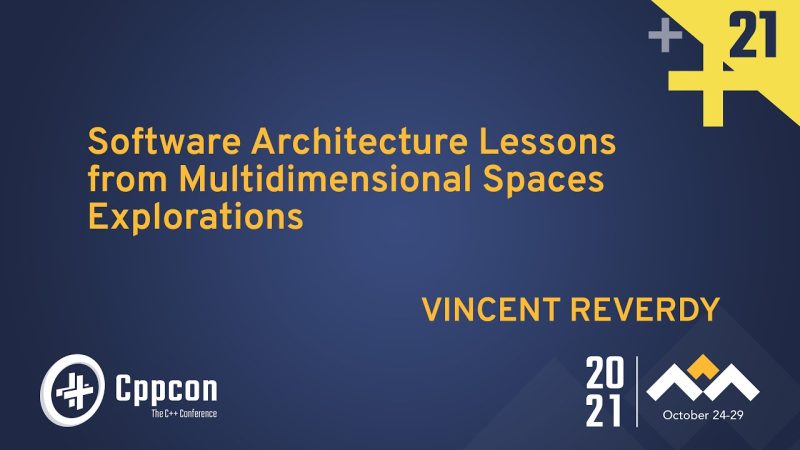
https://cppcon.org/
https://github.com/CppCon/CppCon2020
---
Designing software can be fun, but designing good, clean, reliable, and rock-solid libraries can be of incredible complexity. In this talk we will explore what lessons can be learned on software architecture and domain specific languages design from an exploration around multidimensional arrays and linear algebra. The goal will be to review some guiding principles for good software design in C++20 and discuss programming strategies to attack the problem of compositionality. This talk will aim at shedding a new light on issues that go far beyond the sole scope of multidimensional arrays and will provide insights about the difficulty of achieving simplicity in software design.
We will start from the problem of making multidimensional arrays finally available in C++ and quickly describe the current state of affairs with std::mdspan. We will then try to understand what fundamentally makes the problem so much more complicated in C++ than in many other programming languages that have been equipped with such abstractions for decades. This will let us introduce the so-called GPE principle "Genericity, Performance, and Expressivity" as a way to frame software architecture problems. We will illustrate how this principle can be used as a guide to improve the current design of std::mdspan once combined with new C++20 capabilities ranging from generic Non-Type Template Parameters (NTTPs) to concepts and including generic lambdas in unevaluated contexts. This example will help us understand when and how advanced programming techniques can be used to implement generic, expressive, and performance-oriented abstractions. We will then extend the reflection to the design of Embedded Domain Specific Languages (EDSLs). We will see why shifting the focus from the functionality and implementation to the user perspective can be a particularly relevant strategy for the design of embedded mini-languages. We will illustrate how this principle can be translated in practice in C++20, especially in the context of generic NTTPs that allow template classes to be literally used as mini-compilers. Regarding our specific example, we will see how advanced C++20 constructs can be leveraged to allow library users to manipulate multidimensional arrays through a natural, concise, and expressive syntax. This will finally bring us to upcoming C++ features such as reflection that we will discuss from the perspective of questions about the nature of complexity in programming languages.
In short, beyond multidimensional arrays, Embedded Domain Specific Languages, and advanced implementation strategies, this talk will try to provide an interesting perspective on modern software architecture principles as well as a discussion on complexity, simplicity, and compositionality in the context of C++20.
---
Vincent Reverdy
Vincent has been working as a post-doctoral researcher at the University of Illinois at Urbana-Champaign (USA) since he obtained his PhD at the Paris observatory (France) in november 2014. His main scientific interests are related to cosmology and general relativity. He his particularly interested in the study of relativistic effects at cosmological scales using high performance simulations run on supercomputers. Because these simulations rely on tree data structures, he started investigating ways to optimize them. He now leads a research team working on tree data structures with main applications in simulations, machine learning, and data science. He also participates into the C++ standardization process and regularly submits proposals to improve the C++ language.
---
Videos Streamed & Edited by Digital Medium: http://online.digital-medium.co.uk
The CppCon YouTube Channel Is Sponsored By:
JetBrains : http://jb.gg/cpptools
SonarSource: https://www.sonarsource.com/


No comment yet, add your voice below!